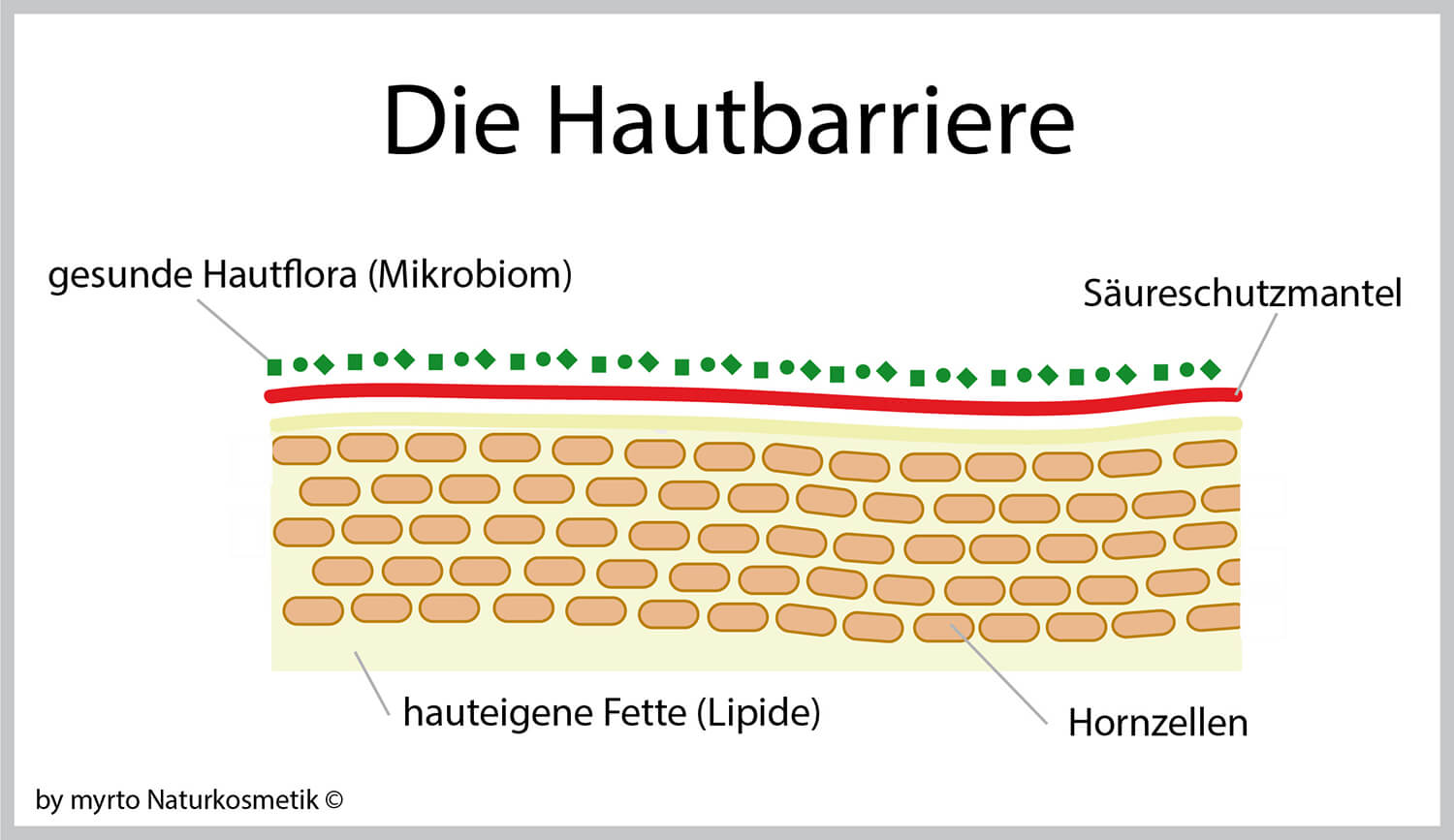Strengthen the skin barrier
If your skin is dry, flaky or cracked, if it is prone to itching, hypersensitivity or redness, this can be an indication of a damaged skin barrier. In this blog post, you will learn what damages your skin barrier and how you can rebuild a damaged skin barrier with the right care.
What is the skin barrier?
The skin barrier, also called the stratum corneum, is the topmost cell layer of the epidermis. It consists of horny cells (corneocytes) that are surrounded by the skin's own fats (lipids) such as ceramides, cholesterol and fatty acids. Together they form a protective layer that protects our skin from microbial germs, pollutants and UV radiation. The structure can be compared to a brick wall: the bricks are the horny cells, the mortar consists of lipids. A strong skin barrier minimizes water loss through the skin (TEWL = trans epidermal water loss). It protects against premature skin aging, irritation and impurities.
The acid mantle (hydro-lipid film)
Our skin also forms a protective hydro-lipid film on the surface. This layer of sweat, fats, amino acids and keratinized cell scales is called the acid mantle. Depending on the region of the body, the acid mantle naturally has a slightly acidic pH value between 4.7 and around 5.5. Undesirable, harmful microorganisms such as viruses, bacteria or yeasts need a neutral or basic pH value to spread. A slightly acidic environment promotes healthy skin flora. This so-called microbiome made up of "good" bacteria, viruses and fungi forms a protective blanket on the skin's acid mantle. It helps to protect the skin from pathogens and environmental pollutants that can cause irritation, itching or blemishes.
Why is a strong skin barrier so important?
The skin barrier has 2 main functions:
- The skin barrier protects the skin from water loss. It minimizes transepidermal water loss (TEWL), which is the main cause of dry skin. A strong skin barrier is the essential prerequisite for healthy, long-term, youthfully smooth skin. It is the best protection against premature skin aging.
- The skin barrier offers protection against damaging environmental influences. It improves the skin's own protection against UV radiation, heat, cold, wind, mechanical and chemical stimuli. It protects against environmental pollutants and microorganisms such as bacteria or viruses that can cause pimples or skin diseases.
How do you recognize a damaged skin barrier?
You can recognize a damaged skin barrier by these characteristics:
- Dry, rough and flaky skin
Due to the loss of moisture, the skin appears dry, rough and flaky, combined with a feeling of tension.
- Redness, inflammation and itching
Visible redness indicates irritation. The skin is prone to inflammation.
- Skin impurities or diseases
Increased susceptibility to skin impurities and pimples, but also to infections, eczema and neurodermatitis.
- Dull and pale skin
The complexion appears dull because the protective layer is disrupted and less moisture is retained in the skin.
- Reduced elasticity
If the protective barrier is damaged, the skin loses its elasticity. It tends to sag prematurely and form wrinkles.
- Hypersensitivity
The skin can react hypersensitively to products that previously did not cause any problems.
How can you rebuild a damaged skin barrier?
In order to rebuild your skin barrier and strengthen it in the long term, it is important to recognize the causes of the disruption and avoid barrier-damaging factors. Below we will look at the most important causes of a disrupted skin barrier.Don'ts for a strong skin barrier
-
Emulsifiers
Emulsifiers hold together the fatty and water-containing components of care products. However, they have one major disadvantage: emulsifiers continue to emulsify in the barrier layer of our skin. In doing so, they dissolve important protective substances from the skin's lipid layer, which are washed out the next time it comes into contact with water. Our skin's ability to retain moisture is thus weakened. The skin becomes more permeable to harmful substances and is then prone to chronic dryness, hypersensitivity, pimples and blemishes. The more we apply such emulsifier-containing products, the worse it gets - a vicious circle. - Hard surfactants
Surfactants containing sulfates such as sodium lauryl sulfate or sodium laureth sulfate in high concentrations (among the top 5 main ingredients on the ingredients list) dissolve the skin's own lipids in the barrier layer from their solid bond and make the skin permeable to harmful substances. -
Cosmetics containing mineral oils
Avoid cosmetics with ingredients made from synthetic oils, i.e. mineral oil. Silicones and paraffins are free of allergens, but they weaken the skin barrier. They seal the surface of the skin and thus prevent water loss. However, they hinder the natural breathing of the skin, can significantly worsen the skin's appearance and be responsible for premature skin aging. Long-term use of products containing minerals leads to the skin becoming increasingly passive and hardly producing any of its own lipids (fats). -
Excessive peelings
Peelings with rough mechanical peeling particles such as sand or salt particles can damage the protective barrier if used frequently. The risk of irritation, redness, itching and inflammation increases. Be careful with barrier-damaged and hypersensitive skin when using high-dose fruit acids, retinol and pure vitamin C in high concentrations, which can have an overly exfoliating and irritating effect. -
Alkaline cosmetics
The pH value of alkaline cosmetics is usually in the range of around 7.5 to 9.0 - significantly higher than the pH value of our naturally slightly acidic skin surface of 4.5 to 5.5. Solid hair soaps also have a high pH value in the alkaline range. What's the problem with that? Alkaline cleansing destroys the acid mantle. It dries out the skin in the long term and makes it susceptible to harmful microorganisms that can penetrate the body. -
Alcohol
Many face creams contain alcohol. Alcohol makes skin problems even worse, especially for sensitive, irritated skin. Why? Alcohol dissolves the skin's own fats from the lipid barrier. Alcohol therefore weakens the skin's natural barrier protection, causes the skin to dry out and promotes blemishes. Even for facial skin that quickly becomes oily, alcohol is not a recommended ingredient. Degreasing the skin stimulates sebum production even further. The skin tries to replace what it has lost. Oily skin becomes even oilier, but is still dehydrated and prone to redness, inflammation and pimples.
Harmful alcohols also include the group of fatty alcohols, which, as co-emulsifying components of the formulations, release the skin's own lipids from the barrier layer. - Unhealthy lifestyle
Not only chronic stress and lack of sleep, but also the frequent consumption of fast food, nicotine and alcohol consumption damage the skin's natural acid mantle and weaken the skin barrier. This makes it easier for harmful substances and pathogens to penetrate the skin.
Do's & Tips for building a strong skin barrier
-
Emulsifier-free face creams with skin-like phospholipids (INCI: Hydrogenated Phoshatidylcholine)
The saving solution for dry, impure or problematic skin is a face cream that is free of skin-weakening emulsifiers. Instead, it should contain skin-analogous active ingredients with a lamellar lipid structure - just like the skin barrier. Phosphatidylcholine is similar to the skin's own membrane structure, strengthens the skin barrier and makes the top layer of skin (horny layer) water-repellent. Phosphatidylcholine stabilizes the cell membranes, stimulates cell metabolism and minimizes moisture loss in the skin, which can be measured as reduced TEWL (TEWL = trans epidermal water loss). These biomimetic face creams are modeled on nature. They are able to rebuild and strengthen the skin barrier. The myrto face creams can therefore be advertised as "emulsifier-free" in accordance with the EU Cosmetics Regulation. -
Beta-glucan
The powerful natural ingredient beta-glucan also strengthens the skin barrier. As an essential component of all myrto face creams and serums, beta-glucan soothes irritated skin, inhibits inflammation and prevents blemishes. Beta-glucan improves the immune protection of cells, strengthens the skin's own UV protection, and provides plenty of long-lasting moisture. -
Skin-identical unsaturated fatty acids
Skin-identical unsaturated fatty acids (omega fatty acids) from cold-pressed plant oils have also proven to be effective in regenerating a damaged protective barrier:-
Linoleic acid (omega 6) - high levels are contained in grape seed, black cumin or argan oil,
-
Gamma-linolenic acid (Omega 3) - abundant in rosehip, pomegranate seed, hemp or evening primrose oil,
-
Palmitoleic acid (Omega 9) - contained in macadamia or sea buckthorn pulp oil.
-
Conclusion: Long-term healthy skin thanks to a strong protective barrier
If you follow this approach of skin-identical cosmetics without the usual emulsifiers, alcohol, fragrances and unnecessary additives, you should soon notice a significant improvement in the condition of your skin. A strong skin barrier not only ensures smoother, softer and healthier skin, but it is also the best protection against environmentally-induced cell damage and premature skin aging - for a long-term, youthful, radiant complexion.


